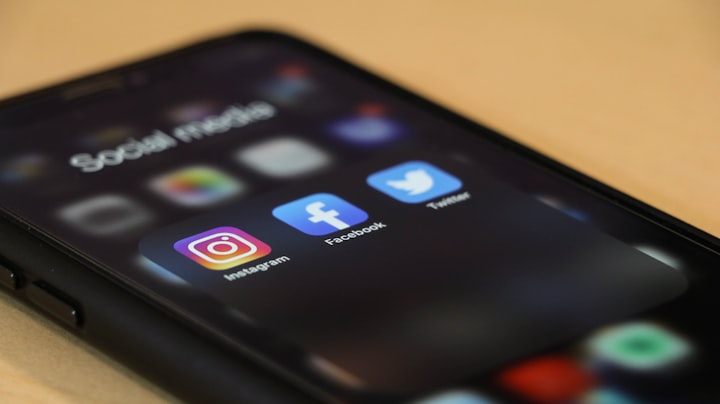Social media is killing our mental health.
Everything it stands for is a lie.
As of January 2022, there were 4.8 billion social media users around the world.* Out of all of the social media apps that exist, Facebook is by far the most widely used, with more than two and a half million monthly users. Don't get me wrong: social media has its perks. With each of these, though, comes a problem that I think makes social media much more toxic than helpful. I've always been an avid social media user - but recently deleted my Facebook due to the toll it was taking on me emotionally. It's the biggest networking site in the world. It's going to come with some issues.
1. There's a constant need to prove yourself. Instagram, especially, is tailored to make everyone else's life seem better than yours. This is the case with all networking sites, but I've found it to be especially bad on image sites like Instagram. In my experience, there's always a sense of inferiority that comes with following popular creators. I wish I looked like that. I wish I were popular. I wish my life were this put-together. That's the problem, though. That's the point of social media. As a trans person on the internet, I find myself comparing my transition to other people's every time I log into social media. Naturally, a year into my transition, I'm not going to look like men four years into theirs.
It's always hard to remember that people only share what they want us to see. Taking model-esque photos in front of an aesthetic backdrop makes it seem like you're fashionable and attractive all of the time, and not just posing for social media. I've tried to come to terms with the fact that it's not social media making me feel bad about myself: it's the insecurities that have stuck with me for years. I want to show that I'm confident and attractive like everyone else, even if I'm not. If our posts don't get enough likes, or enough attention, we feel inferior and disappointed.
2. It's full of cyberbullies. As a trans person living in the most conservative part of Canada, every day feels like an ongoing battle with trolls. I put time and effort into attempting to educate those that don't want to be educated, and I'm left feeling frustrated and more than a little triggered. I know that the goal of an internet troll is to get underneath my skin. I know that identifying and overcoming my triggers will make it easier to go on with my day without being affected. It's not just this, though. The internet feels unsafe. It feels unwelcoming. I can't tell if the threats and hate I receive are genuine, or just an attempt to get under my skin. Maybe both. It shouldn't matter, though, what these types of people say. They'll always exist, and I'll always be trans.
3. Your entire life is on display. For well-known influencers especially, there's no such thing as privacy on the internet. Even the things a personality tries to keep private are brought to the surface by fans who can't seem to mind their own business. Everything is judged, talked about, and investigated by internet sleuths. A lot of the time it seems as though people have too much time on their hands: thrusting themselves into things that have nothing to do with them, about a person they know only from a very tailored perspective. I used to think I wanted to be famous, even if it was only online. But I like my privacy, and I find it intrusive to dig online for things that are purposely kept private.
4. It's dangerous. It's not a secret that social media has been responsible for thousands of deaths globally since its inception. There have been multiple infamous news stories of social media challenges leading to the deaths of its participants, or cyberbullying that results in suicides. Despite this, social media remains absurdly popular around the world: a way of being popular, or of proving yourself. In 2006, a teenager named Megan Meier died by suicide after being catfished and cyberbullied by who she believed to be a teenage boy. In 2018, two preteens were charged with cyberstalking after cyberbullying a classmate into suicide. And we all know the stories of Conrad Roy and Amanda Todd: both of whom have become infamous online in the 2010's.
I can't lie here. I worry about how social media will affect my son as he gets older. It's filled with toxic trends and hateful people - and as a gender non-conforming child, he's already received a fair share of bullying at the age of six. There's sheltering, of course, but this does much more harm than good. In the end, social media makes its way into people's real lives in some way or another.
5. It further stigmatizes mental illness and disability. This is because it's so easy to spread misinformation on the internet, and so easy to get people to believe it. The disabled and mentally ill are ostracized already. With false information spread so often on social networking sites, they become further isolated and misunderstood by those who don't understand them. This happens in the news all too often: a crime is committed by a mentally ill person, and they become a danger to everyone around them. I read a news story recently about a man in my town said to be having a psychotic break and brandishing a gun. It's always the mental well-being that's focused on in news stories like this - denying any plausible motive other than mental instability. This is maddening and misinformed. If a person is struggling with their mental health, they're often branded as a criminal and a liability instead of given the help they need.
This happens most often, I find, with those who have personality or psychotic disorders: the most misunderstood of all. The truth is that these people do not become criminals only because they are mentally ill. It's a combination of environmental and genetic factors - and often a lifetime of trauma - that leads to this outcome.

The thing about social media is that, while it can be great, it's one of the biggest killers of mental wellness and individualism. Still, it's not something that's likely to go away any time soon, so we must learn to balance our internet lives with our real ones.
------
*https://statusbrew.com/insights/social-media-statistics/
**https://en.wikipedia.org/wiki/Social_media_and_suicide#Impact_of_pro-suicidal_sites,_message_boards,_chat_rooms_and_forums
About the Creator
ghostsandrebels
i'm a a queer writer, poet, cat lover, and author. i'm passionate about psychology, human rights, and creating places where lgbt+ youth and young adults feel safe, represented, and supported.
29 | m.
follow me on threads for more.







Comments
There are no comments for this story
Be the first to respond and start the conversation.